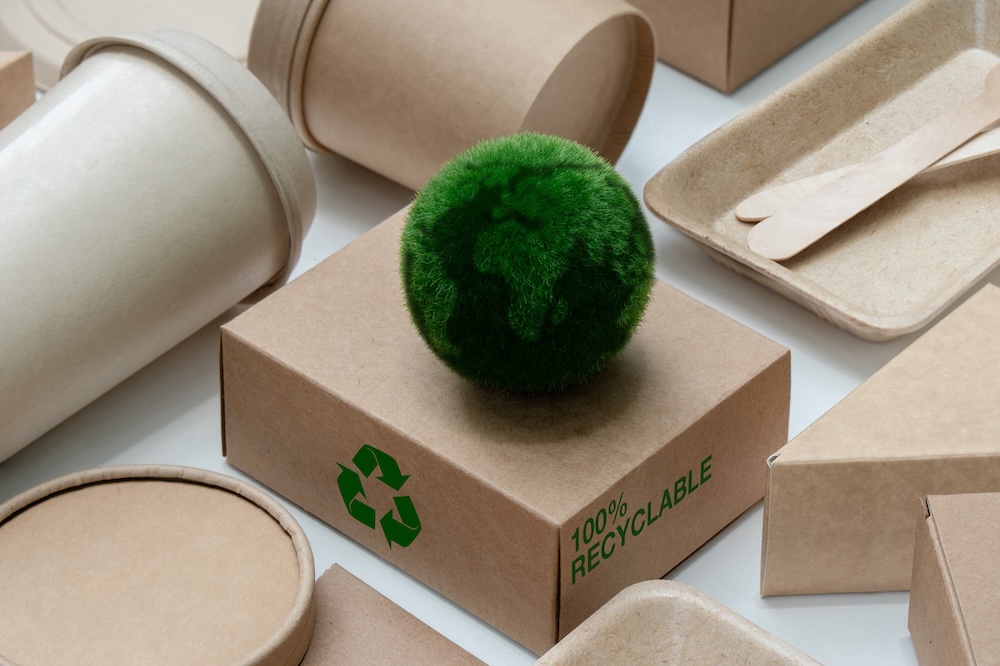Our daily choices ripple far beyond our closets and kitchens. Clothing fibers and food packaging may seem ordinary, but they are among the most resource-intensive and polluting parts of modern consumption. From toxic dyes to plastic waste choking oceans, these industries leave a heavy footprint. The good news? We now have viable, responsible alternatives that reduce harm, conserve resources, and build healthier systems for both people and the planet.
Sustainable Clothing Alternatives
Traditional textiles such as conventional cotton and polyester have outsized environmental impacts. Cotton is water-intensive and heavily reliant on pesticides, while polyester is petroleum-based and sheds microplastics. Fortunately, several materials are emerging as stronger, more responsible options:
Organic Cotton
- Produced without synthetic pesticides or fertilizers.
- Requires less water than conventional cotton.
- Safer for farm workers and healthier for surrounding ecosystems.
Hemp
- One of the fastest-growing plants, thriving with minimal water and no pesticides.
- Naturally resistant to pests and improves soil health.
- Versatile for textiles ranging from sturdy denim alternatives to lightweight blends.
Tencel (Lyocell)
- Made from wood pulp in a closed-loop system that recycles water and solvents.
- Uses significantly less energy and water than cotton or polyester.
- Soft, durable, and biodegradable under the right conditions.
Recycled Polyester
- Produced from post-consumer plastic bottles and textile waste.
- Reduces landfill and ocean plastic while lowering reliance on virgin fossil fuels.
- Still sheds microfibers, so best when blended with natural fibers or paired with washing filters.
Bamboo
- Grows rapidly without fertilizers or pesticides.
- Can be processed into soft textiles, but requires careful oversight: some methods rely on toxic solvents.
- Seek certified closed-loop bamboo viscose or mechanically processed bamboo.
Sustainable Food Packaging Alternatives
Packaging is one of the largest contributors to single-use plastic waste. Globally, only 9% of plastic is recycled, with the rest landfilled, incinerated, or polluting waterways. Alternatives are available, but not all are created equal:
Compostable Packaging
- Breaks down into organic material under industrial composting conditions.
- Useful for food service businesses, but requires access to proper composting facilities.
Biodegradable Plastics
- Made from renewable feedstocks like cornstarch or sugarcane.
- May decompose faster than traditional plastic, but some types still leave microplastic residues.
- Must be clearly labeled to avoid consumer confusion.
Paper & Cardboard
- Renewable and recyclable, provided it is not coated in plastic film.
- Works best for dry goods or when paired with compostable linings.
Glass
- Reusable, infinitely recyclable without losing quality.
- Heavier than alternatives, which can increase transport emissions. Best for local systems.
Metals (Aluminum, Tin, Steel)
- Infinitely recyclable with high recovery rates.
- Lightweight and durable, making them strong candidates for closed-loop packaging.
Sustainable Alternatives in Practice
Businesses across industries are demonstrating how these materials can be scaled responsibly:
- Patagonia pioneered recycled polyester in outdoor apparel and operates a repair and take-back program.
- Chipotle and Panera Bread have introduced compostable packaging for takeout orders.
- TerraCycle specializes in recycling “hard-to-recycle” items, from coffee pods to cosmetics packaging, turning them into new products.
These examples prove that consumer demand, paired with business innovation, can accelerate a shift toward systemic change.
The Benefits of Choosing Sustainable Alternatives
Environmental Benefits
- Reduced water usage and pesticide runoff from organic cotton and hemp.
- Less chemical waste through closed-loop Tencel production.
- Lower plastic pollution from recycled polyester and reusable packaging.
Economic Benefits
- Lower waste disposal costs with compostable or recyclable materials.
- Potential savings from recycled feedstocks compared to virgin inputs.
- Increased customer loyalty and brand value among eco-conscious consumers.
Social Benefits
- Improved working conditions for farmers using organic and fair-trade systems.
- Cleaner air, water, and soil for local communities.
- Public awareness campaigns tied to responsible brands foster cultural change.
Challenges to Scaling Sustainable Alternatives
While progress is visible, barriers remain:
- Cost & Accessibility: Sustainable materials can be more expensive or limited in supply.
- Infrastructure Gaps: Compostables require industrial facilities; recycling rates vary widely by region.
- Consumer Awareness: Mislabeling and “greenwashed” claims create confusion.
- Policy: Stronger regulations and incentives are needed to level the playing field for truly sustainable solutions.
Final Thoughts
Clothing and packaging will always be part of daily life — the question is whether we continue business as usual or embrace alternatives that align with a livable future. Choosing organic cotton over conventional, compostables over single-use plastics, or reusables over disposables may feel small, but these shifts ripple outward. They encourage better farming, smarter design, and corporate accountability.
Every purchase is a signal. By favoring sustainable options and supporting companies that prioritize responsibility, we can push entire industries toward healthier practices — building a future that is not just less harmful, but genuinely regenerative.








